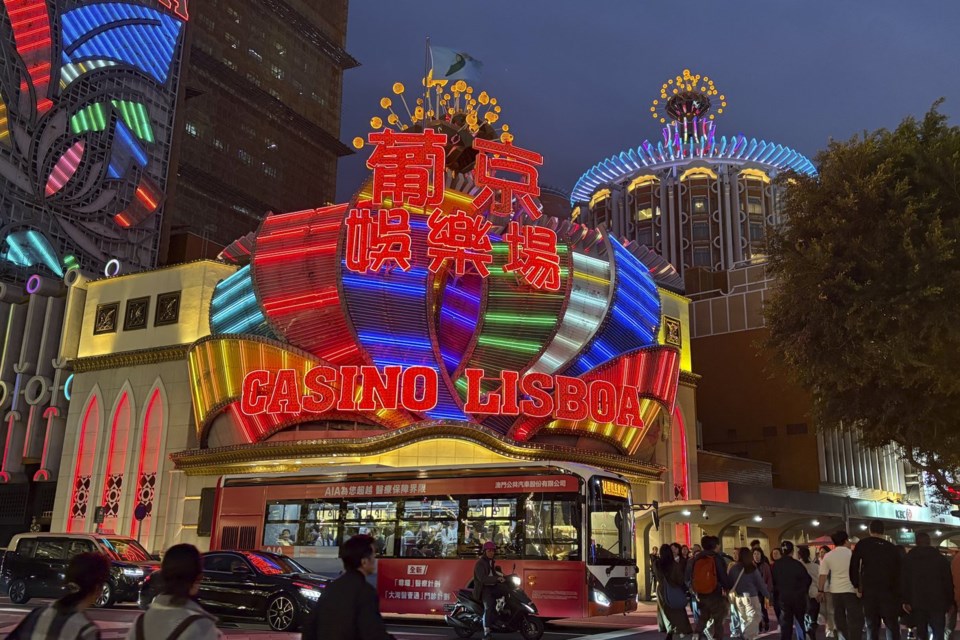MACAO (AP) — When Portugal in 1999, coffee shop owner Daniel Chao was a first grader living in a different world.
Since then his sleepy hometown has transformed into lined with glittering casinos. Its once quiet streets are now jammed with tourist buses. But the growing wealth of the city dubbed the “Las Vegas of the East” has not brought qualities of sustainable development such as economic diversity and high civic participation.
“What was once a relaxed, free place in my childhood has become a place that is crowded and highly commercialized,” said Chao.
Macao will mark the 25th anniversary of its return to Chinese rule on Friday. Chinese President Xi Jinping and the city is festooned with celebratory banners and other decorations. A fireworks display is planned for next week.
Since 1999, the city of 687,000 has transformed from into the world’s biggest gaming hub, packed with mainland Chinese tourists. Its GDP per person has more than quadrupled to $68,000, roughly on a par with Denmark and Australia and surpassing Hong Kong's of about $50,000.
China rules Macao under a “one country, two systems” arrangement similar to its governance of Hong Kong, a former British colony. Macao is the only Chinese city where casino gambling is legal and it has resorts run by affiliates of the American gaming giants MGM Resorts, Las Vegas Sands and Wynn Resorts.
Since Macao opened its casino market following the handover to Beijing, its economy has grown to $46 billion in 2023 from $6.5 billion in 1999, despite during the COVID-19 pandemic and that have facilitated visits by high-roller gamblers from elsewhere.
The economic growth has come at a cost.
Chao’s mother worked at a casino job that brought better pay and a bigger apartment, but also stress and irregular hours. He remembers doing homework at 5 a.m., after her night shift. When he was working as a teacher, his students often went to sleep late or had to rely on paid tutors because their parents also worked casino shifts.
The city’s tourism boom has brought years of easy money that gave its businesses scant incentive to strive to improve their products or services and develop the resilience needed to overcome the hard times of the pandemic and competition from mainland Chinese products, Chao and some other residents said.
Chao has considered leaving the city, but opted to stay.
“Leaving must come at a heavy price,” he said, adding that “it seems Macao isn’t exactly unlivable yet.”
The ruling Communist Party's agenda for Macao now holds sway, with city leaders often referring to national plans. That’s a marked shift from the past, when the city rarely felt any direct impact from Beijing, said Ieong Meng U, a professor at the government and public administration department of the University of Macao.
He expects Macao to become increasingly integrated with nearby Guangdong province over the next decade, following plans to promote tourism, Chinese medicine, finance, technology and exhibitions.
China has designated a special zone on Hengqin island in neighboring Zhuhai city, jointly run by Guangdong and Macao, that is planned to have about 120,000 Macao residents by 2035.
The closer economic ties have coincided with more intrusive political controls, especially after huge anti-government protests in Hong Kong in 2019 that led Beijing to crack down on virtually all public dissent.
A vigil commemorating China’s bloody 1989 military crackdown on the was banned. Pro-democracy figures were barred from running in Macao's 2021 legislative elections. Last year, the city toughened its . In November, Macao Journalists Association expressed concerns over signs of declining press freedom, saying some local media outlets have been asked to withdraw their articles due to political pressure.
Activist Jason Chao, no relation to Daniel Chao, decided to leave.
After years of working to promote greater democracy, he grew frustrated by officials' lack of willingness to change and the tendency of Macao residents to rely on solving problems through seeking Beijing's help or personal connections rather than civic participation, a habit he says partly stems from the city's colonial heritage under Portuguese rule.
“I exhausted the tactics I had learned at that time," Chao said.
In 2017, Chao left to study overseas. He's now a director of a civil society organization serving Hong Kong immigrants in Britain.
Some older residents believe life has improved in the past quarter century.
Ka Man Chun, a retiree, likes the annual cash handouts, funded by gaming tax reserves, that the government has given residents since 2008. This year, each permanent resident received $1,240,
Ka says he feels safe since he steers clear of politics.
“25 years have passed, there’s nothing really bad,” he said.
Macao’s public security, economy and welfare have improved significantly from the colonial era, said Anna Ng, a flower shop owner in her 60s.
Though critics say Macao has failed to , Ng sees signs of progress in the city’s growing exhibition industry and says she's found new opportunities in cultural and creative activities.
Enid Ieong said she has grown bored with the city's limited choices for careers and leisure activities and wants to join her boyfriend in Hong Kong. She dreams of living in Hong Kong's Sai Kung, an area famous for its scenic beauty and beaches.
Ieong mocked the annual cash handout as compensation for what she calls the psychological damage of living in a gaming hub.
“I feel like I was born in a grand mansion, but am only responsible for sweeping the floor,” she said.
Kanis Leung, The Associated Press



